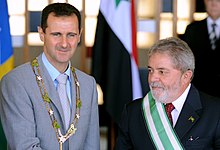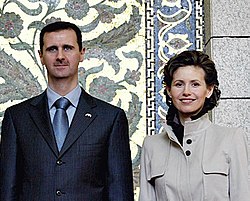Bashar al-Assad
Bashar Háfez al-Ássad (in Arabic, بشار حافظ الأسد, Baššār Ḥāfiẓ al-ʾAssad, pronounced /baʃˈʃaːr ˈħaːfezˤ elˈʔasad/; Damascus, 11 September 1965) is the current president of the Syrian Arab Republic, ruling since July 17, 2000 after succeeding his father, Háfez al-Ásad. He is also the president of the Syrian Arab Socialist Baath Party since July 24, 2000, also succeeding his mother.
Al-Assad graduated from Damascus University School of Medicine in 1988, and began working as a military medic in the Syrian Arab Army. Four years later, he attended postgraduate studies in London, specializing in Ophthalmology. In 1994 his older brother, Basel, died in a traffic accident. Bashar returned to Syria to resume his brother's role as natural heir. He entered the military academy, and took charge of the Syrian occupation of Lebanon in 1998. In December 2000 Assad married Asma al-Asad, a computer science graduate and economic analyst for Deutsche Bank and JP Morgan.
Political scientists have characterized the Assad family's rule in Syria as a personalist dictatorship. On July 17, 2000, Assad became president, succeeding his father, who died in office a month before. In the uncontested elections of 2000 and 2007, he received 97.29% and 97.6% support, respectively. On July 16, 2014, Assad was sworn in for another seven-term term. years after other elections gave him 88.7% of the vote. The polls were held solely in areas controlled by the Syrian government during the ongoing civil war in that country and were criticized by the UN. Assad was re-elected in 2021 with more than 95% of the vote in other national elections. These elections have been criticized by international observers, as well as by the Syrian opposition, for being fraudulent and undemocratic. Throughout his tenure, human rights groups have described the human rights situation in Syria as poor. Assad's government describes itself as secular, while some political scientists write that his regime exploits sectarian tensions in the country and relies on the Alawite minority to stay in power.
Although many states considered him a potential reformer at the time, the United States, the European Union and most of the Arab League called for Assad's resignation from the presidency in 2011 after he ordered a violent crackdown on protesters of the Arab Spring, which led to the Syrian civil war. In December 2013, the UN High Commissioner for Human Rights, Navi Pillay, declared that the findings of a United Nations investigation implicated Assad in crimes of war. The OPCW-UN Joint Investigative Mechanism concluded in October 2017 that the Assad government was responsible for the Khan Sheijun chemical attack. In June 2014, the US organization Syrian Accountability Project listed Assad in a list of war crimes charges against government officials and rebels that he sent to the International Criminal Court. Assad has denied the war crimes charges and has criticized the US-led intervention in Syria for attempting regime change.
Biography
Childhood
Bashar al-Ássad was born in Damascus on 11 September 1965, the son of Aniseh and Háfez al-Ásad. His father, born into a poor family of Alawite origin, rose through the ranks of the Baath Party to seize control of the Syrian branch in the corrective Syrian revolution of 1970, culminating in his presidency. Hafez al-Assad rose to his supporters within the Baath Party, many of Alawite origin as well. His surname in Arabic means "the lion& #34;.
Unlike his brothers, Basel and Shabbih Maher, and his sister Bushra, Bashar was quiet and reserved, saying he had no interest in politics or the military. He later said he only got into the office of his father once while he was in the presidency, and never discussed politics with him. He took his primary and secondary education at al-Hurriya Franco-Arabic School, in Damascus. In 1982, he graduated from high school and left to study medicine at Damascus University.
Career
In 1988 Bashar el-Assad graduated from medical school and began working as an Army doctor at the largest military hospital, "Tishrin," on the outskirts of Damascus. Four years he later went to the UK to begin his postgraduate studies in ophthalmology at the Western Eye Hospital, part of the St. Mary's group of learning hospitals in London. At this time Bashar had few political aspirations. His father had been grooming his older brother Basel as future president, although he never declared his intentions. Bashar, however, was called up to the Syrian Arab Army in 1994 after Basel's death in a traffic accident.
Rise to power
Shortly after Basel's death, Hafez al-Assad made the decision to make Bashar the new heir. For the next six and a half years, until his death in 2000, Hafez was in charge of systematically preparing Bashar for his takeover. Preparation for a smooth transition was done on three levels. First, support for Bashar was built in the military and the security apparatus. Second, Bashar's image was established with the public. And finally, Bashar became familiar with the mechanisms to govern a country.
To establish his military credentials, Bashar entered the Homs Military Academy, north of Damascus, in 1994. In 1997 he was promoted in the Syrian Army to lieutenant colonel, and in January 1999 he rose to the rank of colonel. To gain support in the Army, older division commanders were forced to retire, and their places were taken by new, younger commanders. and Alawites with loyalty to Bashar.
In parallel with his military career, Bashar took charge of public affairs. He was granted power and became a political adviser to President Hafez al-Assad and head of the citizen's complaints office. He carried out a campaign against corruption, which allowed him to eliminate potential rivals for the presidency.
In 1998 Bashar took charge of the Syrian occupation of Lebanon. Since the 1970s, Vice President Abdul Khaddam had been in charge, one of the few Sunni officials in Assad's government and a possible candidate until then for the office of president. By dealing with Syrian affairs in Lebanon, Bashar was able to remove Khaddam and establish his own power base in the country. That same year, after consulting with Lebanese politicians, Bashar installed Emile Lahoud, a loyal ally, as President of Lebanon and removed former Prime Minister Rafik Hariri.
To further weaken the old Syrian order in Lebanon, Bashar replaced the long-serving de facto High Commissioner of Lebanon, Ghazi Kanaan, with Rustum Ghazali.
Presidency
When his father died in 2000, Bashar was promoted to General of the General Staff and Supreme Commander of the Syrian Armed Forces. Appointed sole candidate by the Socialist Arab Baath Party for the presidency of the Republic, he was elected by referendum on July 10, 2000, taking office on July 17. The start of his term raised a hope for democratic change and a liberal economic opening that was welcomed by the West (France awarded him its Legion of Honor, which was withdrawn in 2018).
However, time demonstrated the continuity of his father's policy. After the "democratic" opening of 2012, he revived his liberal policies by promoting privatizations and gaining new international partners such as China, he also began promoting tourism to the Syrian Mediterranean coast.
Faced with the threat of the idea of preventive war carried out by the US administration, the instability in Lebanon (where Syria maintained a strong military presence) and the constant tensions with its neighbor Israel, Bashar al-Ássad tried to have a reformist discourse that could satisfy the wishes of the European Union and the United States, but that in practice meant no concessions to the Syrian opposition movement.
Strong international pressure on Bashar al-Assad after the death of former Lebanese Prime Minister Rafik Hariri, whose responsibility was attributed to the Syrian secret services, led Al-Assad to order the withdrawal of Syrian troops stationed in Lebanon. Bashar al Ássad was re-elected in a referendum called for this purpose on May 27, 2007, boycotted by the opposition in exile and in which he obtained a 97.62% favorable vote. He was re-elected again in the presidential election on June 3 of 2014.
Since 2011, with the start of the Syrian Civil War, different Arab countries, the European Union, the United States, Turkey and other governments have demanded the resignation of Bashar al-Assad, while governments of other countries such as Iran (main ally in the region), Russia, China, North Korea, Venezuela, Bolivia, Ecuador and Cuba condemn or do not support foreign intervention or a change of government in Syria.
In January 2013, after United Nations and Arab League envoy Lakhdar Brahimi said that al-Assad should not participate in a transitional government, Walid Mualem, Syrian Foreign Minister, called on the opposition groups to join a new cabinet under al-Assad, but only if they "reject foreign intervention" in Syria.
The US Secretary of State, John Kerry, even admitted in leaked audio that he hoped the growth of Daesh could push Al-Assad to negotiate, however the Russian intervention forged a support that prevented it from taking hold. approached the negotiating table.
Private life
He attended secondary school at al-Hurriyah French-Arabic school in Damascus. Later, he studied medicine specializing in ophthalmology, after doing an internship as a medical officer in a military hospital, he completed his medical studies in London, at the Western Eye Hospital, where he specialized in the treatment of glaucoma. He speaks English fluent and has basic conversational skills in French.
In December 2000, Assad married Asma al-Ásad, née Akhras, a British citizen of Syrian origin, originally from Acton, London. On December 3, 2001, they became the parents of their first son, Hafez, named after his grandfather Hafez al-Asad. Zein was born on November 5, 2003, and Karim on December 16, 2004. Assad resides in the Presidential Palace in Damascus, where his father also lived while he was president.
Contenido relacionado
Juan Carlos Onetti
Arata isozaki
Garcia I of Leon




